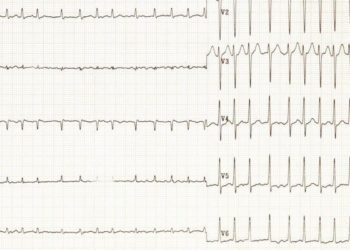Previous concussion linked to prolonged symptoms following second concussion
Image: PD
1. Children who experienced a concussion within one year of their second concussion had significantly greater symptom duration than those with no concussion history.
2. Those with one previous concussion more than a year prior to a second concussion had symptom duration equal to that of children with no concussion history.
Evidence Rating Level: 2 (Good)
Study Rundown: Millions of children are treated each year for concussion and approximately 144,000 of them present to U.S. emergency departments (ED). However, little is known about risk factors for prolonged postconcussive symptoms in children. Results from this study indicate that recent, previous concussions place children at risk for prolonged symptom duration during future concussive events. Children with single, remote concussions may not be placed at such a risk as they were found to have comparable symptom duration to children who had never had a concussion. One limitation of this study was the use of self-report in documenting postconcussive symptoms, which may have led to underreporting among participants. Nonetheless, these findings have implications for the management of pediatric concussion patients who are at risk for future concussive injuries, such as athletes, supporting the notion that ample recovery time may be critical for optimal recovery.
Click to read the study in Pediatrics
Relevant Reading: Prolonged effects of concussion in high school athletes
Study Author, Dr. Matthew A. Eisenberg, MD, talks to 2 Minute Medicine: Division of Emergency Medicine, Boston Children’s Hospital, Harvard Medical School, Boston, Massachusetts.
“While a history of prior concussion has been hypothesized to be a risk factor for a longer recovery time after concussion, this has not previously been clearly demonstrated in the literature. Our study showed that prior concussion is a risk factor for a longer recovery time, but in particular patients with a concussion in the past year or multiple prior concussions had dramatically longer recovery times than those without such risk factors. These findings have significant implications for both clinicians and researchers. For clinicians, it allows them to give better anticipatory guidance to children with a concussion and suggests reason for caution in allowing these patients to return to sports after an injury. For researchers, it demonstrates both a temporal window of vulnerability and a dose-response effect in which the effect of a repeat head injury may be even more deleterious, leading to questions of what pathophysiology is responsible for these findings.”
In-Depth [prospective cohort study]: 207 patients between 11 to 22 years of age participated in the study. All participants presented to the ED within 72 hours of a concussion and filled out baseline surveys independently or with the assistance of parents. They then completed online follow-up questionnaires at 1, 2, 4, 6, 8, and 12 weeks after their ED visit. Patients with a previous concussion within the past year had nearly 3 times the median symptom duration of those with no concussion history or whose most recent concussion took place > 1 year ago (35 days vs. 12 days and 14 days, respectively; p = .007). Patients with 2 or more previous concussions had twice the median symptom duration of patients with 1 or no previous concussions (28 days vs. 14 days and 12 days, respectively; p = .03). Most patients (63.8%) were injured playing a sport, with the most common sport being hockey (14%). Predictors of prolonged symptom duration included history of previous concussion, age >13 years, initial RPSQ* score > 18, female gender, history of depression, absence of LOC**, and abnormal neurologic exam on presentation.
*RPSQ: Rivermead Post-Concussion Symptoms Questionnaire
**LOC: loss of consciousness
By Cordelia Y. Ross and Leah H. Carr
More from this author: Plastic bags reduce hypothermia among premature newborns; Untreated breast milk linked to CMV transmission; Early, limited formula supplementation associated with prolonged breastfeeding; Few clinical drug trials exist for pediatric neuropsychiatric conditions; Many children with cancer exposed to home medication errors; Parents feeding control practices related to child’s weight and gender; Social networks play key roles in parental vaccination decisions; Shorter sleep duration associated with increased adolescent BMI; Varicella vaccine provides 14-year protection against childhood chicken pox
© 2013 2minutemedicine.com. All rights reserved. No works may be reproduced without written consent from 2minutemedicine.com. Disclaimer: We present factual information directly from peer reviewed medical journals. No post should be construed as medical advice and is not intended as such by the authors or by 2minutemedicine.com. PLEASE SEE A HEALTHCARE PROVIDER IN YOUR AREA IF YOU SEEK MEDICAL ADVICE OF ANY SORT. Content is produced in accordance with fair use copyrights solely and strictly for the purpose of teaching, news and criticism. No benefit, monetary or otherwise, is realized by any participants or the owner of this domain.





